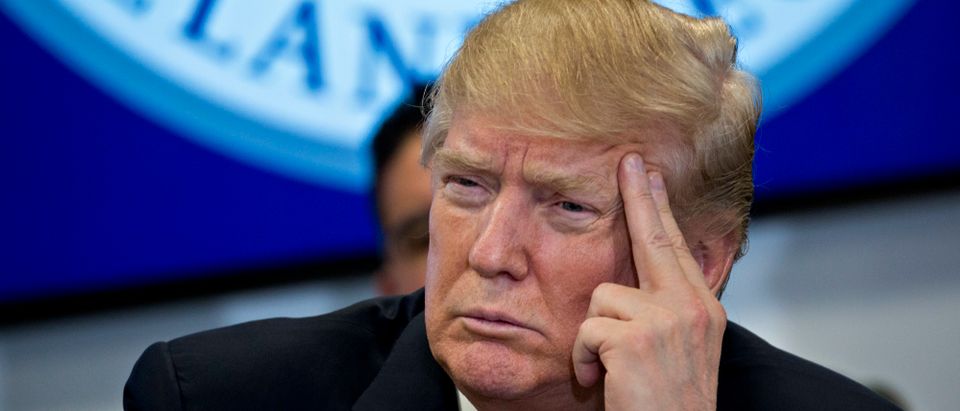While the Trump administration considers what to do with the “other” global climate agreement not the Paris accord, a group of experts met to discuss the matter at the conservative Hudson Institute.
The Trump administration came out in support of the Kigali amendment in 2017, but it’s still unclear what the White House has planned for the international agreement to cut hydrofluorocarbons, or HFCs.
White House energy adviser George David Banks said the administration was still deciding “whether to move forward” with the Kigali Amendment “and how” that would happen given recent legal setbacks.
But most others on Hudson Institute panels seemed to support ratifying the Kigali Amendment to the Montreal Protocol, which would phase out hydrofluorocarbons, or HFCs. The Senate needs to approve the Kigali Amendment before the U.S. can implement it.
Forbes Magazine editor-in-chief Steve Forbes, a conservative, and David Doniger, an attorney with the Natural Resources Defense Council, both agreed the Trump administration should send the Kigali agreement to the Senate for approval.
The air conditioner and refrigeration industry also backs approval of the Kigali amendment, which they see as a way to gain a competitive edge on the rest of the world by over time banning the sale of older air conditioners and refrigerators.
However, Cato Institute climate scientist Patrick Michaels wasn’t sold on the agreement. Michaels challenged the purported climate benefits of phasing out HFCs, which could make household appliances more expensive.
“Why don’t we just leave the climate thing out and say someone’s got a new product they’d like to sell. Stop the charade,” Michaels said during the panel discussion, calling the half degree estimate “fanciful.”
WATCH:
The Obama administration negotiated the Kigali Amendment in 2015, just before United Nations delegates met in Paris to hash out the climate accord Trump said he would withdraw from in June. The White House came out in support of the amendment last fall.
Kigali proponents say an HFC phase-out would avert 0.5 degrees of projected global warming by 2100 and would be a boon to industry by stimulating innovation and demand for new air conditioning and refrigeration appliances.
The industry was divided a few years ago over whether or not to back the Kigali amendment, but Air-Conditioning, Heating, and Refrigeration Institute CEO Stephen Yurek said his members saw “the handwriting on the wall” and wanted to have a say in the process.
Indeed, many U.S. companies have already begun investing in HFC-free products. The New York Times reported in 2016 that “many of the replacement chemicals are manufactured by American chemical companies like Dow and Honeywell.”
“If the United States turns it back on this, it’s doing its industry and economy a disservice,” said Doniger, echoing the sentiments of many Kigali amendment supporters.
But that plays into Michaels’ argument that the Kigali amendment is effectively a handout to U.S. businesses that could make air conditioners more expensive. While that might not be a big deal for Americans, poor countries will bear the brunt of this.
India’s Council on Energy, Environment and Water estimated an HFC phase out would cost upwards of $38 billion by 2050 and keep millions of people from obtaining air conditioning. In China, the costs will likely be higher because because more homes have air conditioning.
But for the U.S., it’s a rare political moment. Many conservatives, environmentalists, industry and the White House support ratification of the Kigali amendment, despite their respective disagreements over the Paris climate accord.
The White House supports Kigali’s ratification, but Trump himself has been silent on the matter.
Once ratified, Doniger and former EPA official Jeff Holmstead pointed out the Trump administration could implement HFC regulations using the Clean Air Act. Holmstead expected the Kigali amendment to secure Senate approval once introduced.
EPA’s last attempt to regulate HFCs was struck down in court. EPA imposed two such regulations in 2016, but two companies that manufacture products with HFCs filed suit.
In August, Judge Brett Kavanaugh ruled EPA could not use legal authority on regulating ozone-depleting substances to control a greenhouse gas.
“Climate change is not a blank check for the President,” Kavanaugh wrote in his opinion.
Follow Michael on Facebook and Twitter

The Daily Caller News Foundation is working hard to balance out the biased American media. For as little as $3, you can help us. Make a one-time donation to support the quality, independent journalism of TheDCNF. We’re not dependent on commercial or political support and we do not accept any government funding.
All content created by the Daily Caller News Foundation, an independent and nonpartisan newswire service, is available without charge to any legitimate news publisher that can provide a large audience. All republished articles must include our logo, our reporter’s byline and their DCNF affiliation. For any questions about our guidelines or partnering with us, please contact licensing@dailycallernewsfoundation.org.


